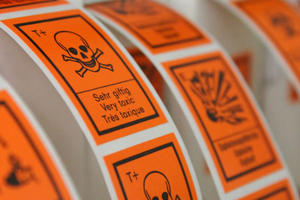The Resource Conservation and Recovery Act (RCRA) was passed in 1976 with the goal of outlining the proper disposal of solid and hazardous waste. We often hear of big offenders paying out millions in fines for violations. However, companies are fined for smaller violations every day. It may not be newsworthy, but we understand that even a small fine can put a hardship on a small or mid-size business. Consider five common RCRA violations.
Environmental Health and Safety Blog | EHSWire
Topics: Emilcott, Resource Conservation and Recovery Act (RCRA), Five Common RCRA Violations, RCRA Violations
Health and Safety Training for Small Business Compliance
Posted by Shivi Kakar
Workplace safety is in everyone’s interest. OSHA recognizes that small business owners face special challenges when trying to implement health and safety training procedures. For starters, operations with a limited staff do not usually have the resources to employ workers whose job description almost exclusively deals with health and safety. Yet business owners, employees and officials also understand that a safe work environment is of paramount importance to companies of any size.
Topics: Emilcott, health and safety training, small business compliance, h&s training for small businesses, Health and Safety Training for Small Business Comp
Critical Incident Stress and Debriefing: An Ounce of Prevention
Posted by Shivi Kakar
Topics: Emilcott, Critical Incident Stress, OSHA Critical Incident Stress, Critical Incident Stress Debriefing (CISD), CISD
Fertilizer Plant Explosion Focuses Congress on the CFATS Program
Posted by Shivi Kakar
Following the deadly explosion of the fertilizer plant in West, Texas, lawmakers in DC are seeking a review of the Chemical Facility Anti-Terrorist Standards (CFATS) which was established in 2007. The program was designed to protect high-risk chemical plants and other facilities from terrorist threats.
Topics: Emilcott, Chemical Facility Anti-Terrorist Standards (CFATS), Fertilizer Plant West, Texas, CFATS Programs
On March 27, 2013, EPA announced the list of 23 chemicals it will begin assessing in 2013, including 20 flame retardant chemicals.
Topics: Emilcott, Toxic Substances Control Act (TSCA), TSCA Work Plan, TSCA Chemicals Announcements, EPA list 23 chemicals
Topics: Emilcott, west texas fertilizer plant disaster, west texas, fertilizer plant explosion west texas
The Fertilizer Plant Disaster in West Texas: Improper Chemical Storage and Reporting
Posted by Shivi Kakar
Topics: Emilcott, west texas fertilizer plant disaster, fertilizer plant disaster, improper chemical storage and reporting
In December 2012, OSHA released its Cadmium Biological Monitoring Advisor within the Dept. of Labor’s set of elaws Advisors. The elaws Advisors are interactive e-tools that provide easy-to-understand information about a variety of federal employment laws. Each Advisor simulates the interaction you might have with an expert of employment law by asking questions and providing answers based on the responses given.
Topics: Emilcott, OSHA Tool to Monitor Cadmium, Cadmium Exposure Monitoring Tools, Dangers of Cadmium Exposure
Because of the increased use of digital technology in the workplace, eyestrain may be one of the fastest-growing occupational health and safety hazards; however, it is probably one of the least addressed. Studies have shown that eyestrain or issues with vision occur in over ½ to ¾ of people working with computers. NIOSH believes that is may have already surpassed carpel tunnel syndrome as the top computer-related workplace physical complaint.
Topics: Emilcott, eyestrain in the workplace, eyestrain concerns, avoiding eyestrain issues
The NJDEP issued an Enforcement Alert Regarding the Use of Emergency Generators
Posted by Shivi Kakar
The NJDEP issued an enforcement alert as part of a compliance advisory to any facility in NJ that owns or operates a stationary internal combustion engine that generates electricity and is permitted as an emergency generator. The advisory is directed at the use of emergency generators for facilities participating in Demand Response and Peak Shaving Programs and which may require air permit revisions and air pollution controls.
Topics: Emilcott, NJDEP, NJDEP Enforcement Alert, NJDEP Emergency Generators












